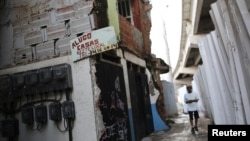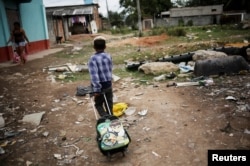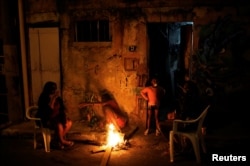Mauricio Hora's family has lived in Rio de Janeiro's oldest favela for generations but despite his deep roots, the artist-activist has no interest in formally owning his home.
Contrary to the views of many economists, he doesn't believe residents of informal settlements like his native Morro de Providencia should hold official property deeds.
"When people have formal titles, they can sell their homes - it's a form of cleansing the favela," Hora told the Thomson Reuters Foundation. "Titles make it easier to remove people... there are no advantages to regularizing these titles."
More than 20 percent of Rio de Janeiro's population live in favelas but most lack formal property rights, a setup common in many big Brazilian cities. Instead, they rely on networks of family, friends and community organizations to buy or sell homes which are not recorded on government registries.
Many economists believe that formalizing property ownership will give poor residents more security and let them buy and sell their homes on the market, like anyone else. Activists say this informality protects favela residents from gentrification, as big investors aren't interested in properties lacking titles.
Hora wants people like him - the son of drug dealer - to pull together and win better social conditions in their gritty downtown neighborhood rather than sell out to the rich.
"My hope is that people with education stay in the community and make improvements in sanitation and infrastructure," Hora said as a police helicopter buzzes overhead.
"There is no point in people getting an education and some culture and then just leaving the favela - because that way the cycle just continues."
Global Problem
Debates on how to manage property rights in the world's informal settlements are becoming ever more pressing, as hundreds of millions of people move into cities from rural areas, with many ending up in fast-growing slums.
In a bid to boost economic growth in the recession-hit nation, Brazil's government has launched a program to make it easier for favela residents to secure formal ownership.
"Titles bring the possibility of putting millions of assets into the economy which can be used in the market to access credit," Bruno Araujo, the minister of cities, said in a statement last month announcing the initiative.
The idea that formal ownership for ramshackle homes in slums can improve the economy by unlocking assets was pioneered by the Peruvian economist and author, Hernando de Soto.
Formal property rights for the 5.3 billion people worldwide who currently lack deeds could unlock more than nine trillion dollars in assets, says de Soto, as slum dwellers could get loans to start businesses using their homes as collateral.
"There is no such thing as an investment without property rights," de Soto told the Thomson Reuters Foundation in a phone interview last year.
'Right to the City'
However some academics and slum residents question these promised benefits, saying they have not materialized in slums where residents have won formal ownership.
"Many countries believed that titles would allow poor people to get finance," Patricia Cezario, a professor of urban planning at the University of Sao Paulo, told the Thomson Reuters Foundation.
"That didn't happen," she said, explaining that banks had little interest in administering small loans to the urban poor. "Favela residents are more concerned with their right to the city itself: access to jobs, health, transport and education."
Tens of millions of Brazilians lack formal property rights, but poor data mean the exact number is unknown, Cezario said.
Slum Gentrification
In some neighborhoods, formal ownership has led to gentrification, as residents sell hillside homes to wealthier people. The poor then end up living further out, facing grueling commutes to find work or access services.
Barbara Nascimento, a resident of the Vidigal favela near Rio de Janeiro's wealthy Ipanema neighborhood, has seen friends move away from the increasingly trendy neighborhood.
"There is a lot of demand for the land," Nascimento told the Thomson Reuters Foundation. "I want residents to be conscious and stay here, instead of selling their houses to people who don't live here."
Small investors have bought houses informally, Nascimento said, with residents' association providing the licenses.
Without hard titles, big institutional investors have not bothered to buy up homes and land in the area, according to an official with a major U.S.-based real estate brokerage firm.











